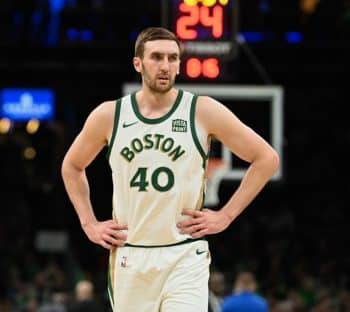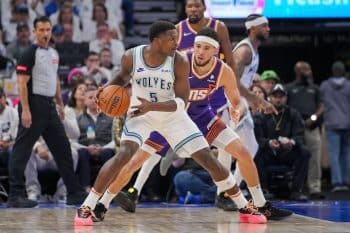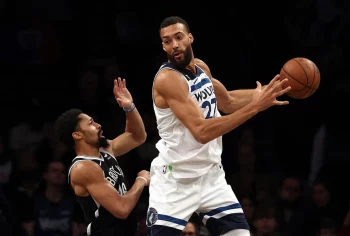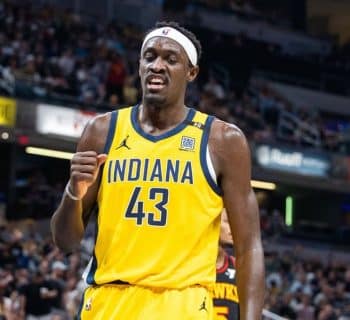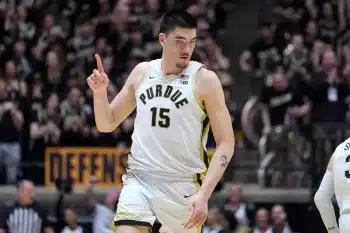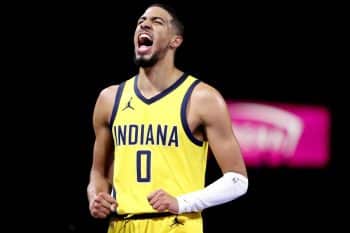NBA
NBA Sunday: Knicks Facing No-Win Situation With Carmelo

Carmelo Anthony hurt the New York Knicks on his way in, and make no mistake about it, he’s going to hurt them on his way out.
In the future, when the obituary of Anthony’s career as a member of the Knicks is written, let it be known that while he is far from perfect, the organization’s failure to achieve more with him as its franchise player was more about it failing to surround him with the pieces he needed than it was his individual shortcomings.
As media day and the openings of training camps near, news on Anthony and his status with the Knicks has predictably slowed. Both the player and the franchise have let it be known that they want a divorce, but with Anthony’s no-trade clause, the Knicks find themselves in the unenviable predicament of getting Anthony’s approval on any trade.
Anthony’s desire to end up in Houston would allow him to team up with Chris Paul and James Harden while also securing him the best opportunity at one final huge contract—something discussed in this space long ago.
At this point, though, unless Anthony suddenly (and surprisingly) becomes interested in waiving his no-trade clause to join the Portland Trail Blazers or another team that could send the Knicks a combination of contracts and future assets to make a trade worthwhile, he will likely be in New York through December 15, at least.
On December 15, players that signed contracts this past offseason become trade eligible, and traditionally, the mid-December date has marked the beginning of the trade season. By that point, most teams will have played between 25 and 30 games and will have an idea of which players and rotations they like and which they don’t.
Concocting the type of multi-team trade that is likely to lead to Anthony’s departure would become much easier to do come mid-December, but that’s bad news for the Knicks.
When Anthony’s obituary as a member of the Knicks is written, it will absolutely include the fact that he has worn as a Scarlett Letter since his arrival in New York—rather than opting to face the uncertainty of the new collective bargaining agreement and sign with the Knicks as a free agent, he chose to muscle James Dolan into executing a trade with the Denver Nuggets. In the process, the cupboard in Madison Square Garden became bare. There were simply no assets left to build around Anthony, and the Knicks had a difficult time finding complementary pieces that could be used to build a contender with him.
The value in signing a player as a free agent as opposed to trading for them is easily seen within the Atlantic Division—just take a look at the Boston Celtics. Danny Ainge struck gold in signing Gordon Hayward this past summer. Although signing Hayward did indirectly cost the Celtics Avery Bradley, they were able to obtain Marcus Morris in return from the Detroit Pistons.
More importantly, though, is that the Celtics were then able to execute a paradigm-shifting trade for Kyrie Irving. Had the Celtics sought to acquire Hayward via trade during last season, or if they were able to pull off a trade for either Paul George or Jimmy Butler, one could argue that they would have been set back. Either of those scenarios could have made a trade for Irving more difficult, if not all together impossible.
The biggest “What if?” that will remain from Anthony’s Knicks career will be what could have been if he had the opportunity to team up with the likes of Danilo Gallinari, Timofey Mozgov, Raymond Felton, Anthony Randolph and the draft picks that the Knicks sent out in exchange for him. Or, more appropriately, what the Knicks may have been able to attain in return for those assets had they not sent them out in exchange for Anthony.
For now, though, the burning question will be how and to what extent Anthony’s presence on the Knicks will impact the 2017-18 team. His mere presence alone gives him one final opportunity to hurt the franchise on his way out—though not in the way that would seem to be more obvious.
* * * * * *
The Knicks are rebuilding.
With Kristaps Porzingis, Willy Hernangomez and Frank Ntilikina, the club is hoping to form some sort of young nucleus that can give the franchise hope for the future.
Anthony, who will turn 34 years old during this coming season, sees the sun setting on his career. At this point, he is playing for his final multi-year contract and for his legacy and brand.
Seen as a one-dimensional player whose own selfishness has undercut his career’s success, Anthony has been deemed to be the 64th best player in the NBA. The publication that ranked Anthony there, over the years, has been guilty of producing commentary that is purposefully inflammatory. Part of the media’s purpose, after all, is to create content that encourages discourse. The best way to accomplish that is to appeal to an emotional fan base and to target a polarizing subject. That is clearly the design here.
Let’s be honest: Anthony can still be argued as being a Top 30 player in the NBA. That the likes of Danny Green, Malcolm Brogdon, Robert Covington and George Hill are ranked ahead of him is nothing short of a poor attempt at humor.
The problem, however, is that there are at least some people who have allowed the Knicks’ failures with Anthony as its franchise player diminish his perceived value.
At this point, on his way out the door in New York, the only way he can restore some of that value is to show up and compete, day-in, day-out.
Based on the talent on their current roster, the combination of over-the-hill pieces and a team that will be searching for an identity, there’s no reason to believe that the Knicks will be a playoff team this coming season. In the NBA, the goal should be to either be a championship contender, or to be as bad as possible to secure the highest draft pick possible. Winning 28 games and securing the 11th pick in the draft serves an almost futile purpose.
The problem for the Knicks, however, is that their long-term interests and Anthony’s short term interests are no longer aligned. For Anthony, each game he plays from this point forth will be about reasserting his value, restoring his brand and proving to his future team that he still has what it takes to be a winning player in the NBA. Anthony is playing for himself and his own personal future; he will likely have no concern as to how that will impact the Knicks in the long term.
Showing up, going through the motions and sulking is not what Anthony is about, and doing so will hurt him more than it will hurt the Knicks. So if you’re curious as to how exactly it is that Anthony can hurt the Knicks on his way out, it’s simple: by being the best player he can be.
* * * * * *
As the 2017-18 season tips off, it’s quite possible that the Knicks will finish fifth in the Atlantic Division, though it is also possible that they could finish as high as third.
With the playoffs not seeming realistic, though, the manner in which they do so will make all the difference in the world.
At this point, Anthony may no longer be capable of being the primary option on a championship contender, but he is still fully capable of being the difference between a team winning 15 games and winning 30 games.
Heading into the season and leading up until December 15, it’ll be interesting to see what kind of impact Anthony has on the Knicks. And when his obituary is finally written, it’ll be just as interesting to see what kind of long-term impact these next few months will have had on the franchise.
